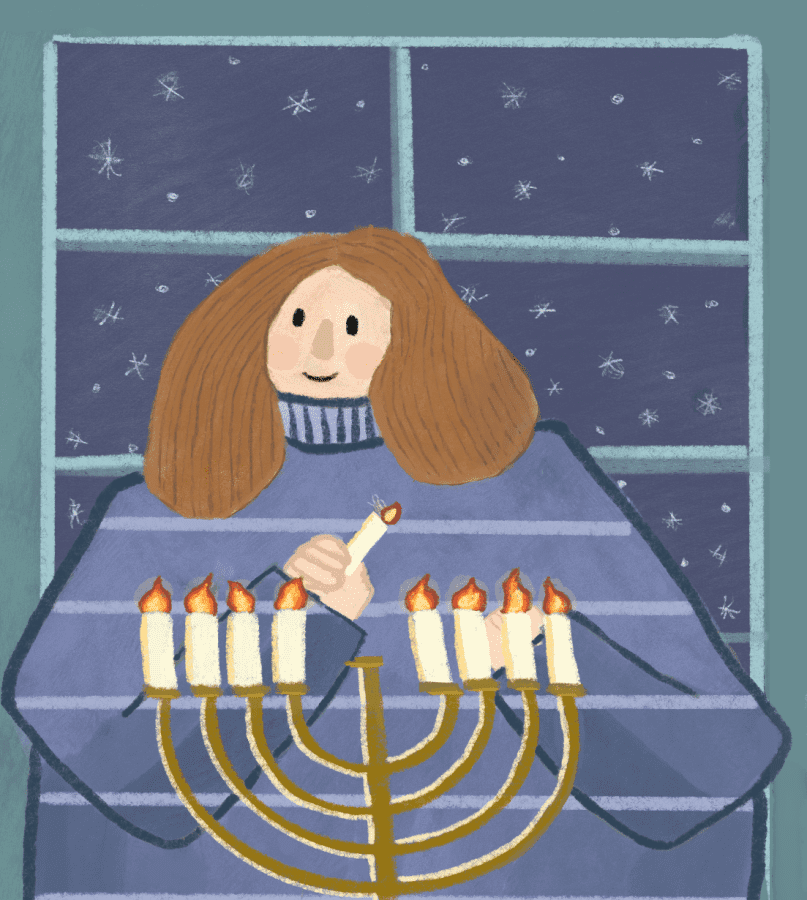The Jewish December dilemma
November 28, 2022
Between Christmas songs playing in every store and festive lights adorning houses, the Christmas season is well underway. For Jews, however, this nationwide joy and cheer isn’t all inclusive.
Many American Jews celebrate Hanukkah instead of Christmas. The eight-night holiday involves lighting a candle on a menorah each night, as well as gift giving. Because it’s based on the Hebrew calendar, the dates change a bit every winter. This year, Hanukkah begins on the night of Dec. 18 and ends on the night of Dec. 26.
Alina Lowenstein, sophomore in LAS, said that people regularly assume they celebrate Christmas.
“It’s funny how every year, most people who I interact with assume that everybody celebrates Christmas and don’t really ask about it,” Lowenstein said. “It’s just sort of a general assumption, but usually people are right because the majority of people do celebrate Christmas.”
Lowenstein said that over time, they’ve gotten used to the prominence of Christmas.
Get The Daily Illini in your inbox!
“I enjoy it,” Lowenstein said. “It’s still like, I get to spend time with my family over break and stuff. I’m pretty used to the whole Christmas mania thing. So, I don’t really think about it much anymore. But yeah, I still enjoy the holidays.
Danielle Guralnick, sophomore in Education, said she likes certain aspects of Christmas festivities.
“I feel like generally, I do like the cheer that comes with it,” Guralnick said. “It’s kind of nice because I love it when everyone puts up the lights … But then, starting (after Thanksgiving), everything is Christmas themed, which isn’t the best.”
Lowenstein said something similar, mentioning that they do appreciate the overall holiday cheer.
“Even not celebrating Christmas, it does make me think of the holidays, and I still get a good feeling from it, even though it’s not something that I really associate with,” Lowenstein said. “But just probably because it’s associated with break and other holidays.”
Maya Raviv, junior in LAS, said that when she first moved here from Israel, the dominance of Christmas bothered her, and it used to feel “very excluding.”
“I think when I first moved here, I was really bothered because I just didn’t really understand why people make such a big noise for a holiday that’s not shared by everyone,” Raviv said. “At the end of the day, Christmas is a really nice and sweet thing, and people have a lot of fun celebrating it. So, I think I look at it with warmth.”
Guralnick said that people assume less on campus than they do in her hometown.
“I feel like on campus, it’s a lot less so that people assume because of the more diverse student body you know, which is nice,” Guralnick said.
Lowenstein said that Hanukkah isn’t as big of a holiday as some people believe.
“I mean, the funny thing with Hanukkah is it’s not a huge Jewish holiday,” Lowenstein said. “The High Holidays are the bigger ones. So, I don’t necessarily feel the need for Hanukkah to be as blown up as Christmas.”
Raviv echoed this sentiment, saying that it isn’t entirely accurate to portray Hanukkah and Christmas as being of equal importance.
“So, (representation is) nice, but I don’t think there should be an excessive effort to include a Hanukkah with Christmas or other holidays that I don’t celebrate just because the grouping of them together is just not accurate,” Raviv said. “It just seems a little performative.”
Guralnick also feels like a lot of inclusivity attempts are performative.
“Every time I walk into a store and I see the one shelf of Hanukkah things I’m like, ‘Oh, they kind of care a little bit,’” Guralnick said. “But then at the same time, I know they don’t actually care.”
Guralnick said that while she used to see Hanukkah as an equivalent to Christmas, she no longer does.
“I used to think about it as my equivalent of Christmas,” Guralnick said. “But it’s not at all — at least to my family. It’s just like the winter one. If I was talking about my equivalent of Christmas, it would be Rosh Hashanah, like a big meal where I’m with all my family and stuff like that. But I don’t know. Hanukkah — it’s a fun holiday.”
Raviv said that while Hanukkah isn’t as big of a holiday as some others, it still brings her joy.
“Back in Israel, everyone celebrated Hanukkah, it was not as big as Christmas here, but it was pretty big because it was like a collective holiday for everyone in the country to share. So, I think Hanukkah is kind of like home to me.”







